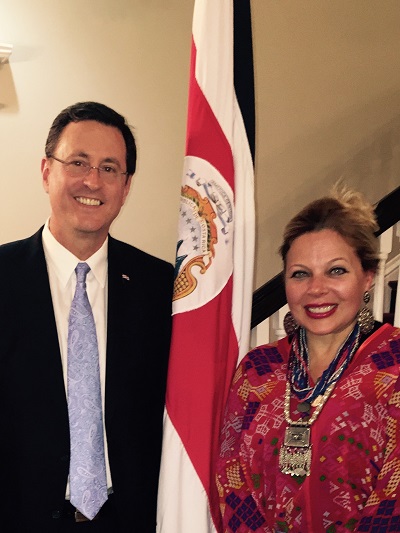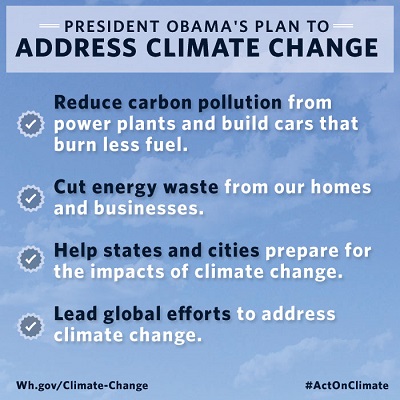Weekly Policy Report
by Edwina Rogers
SPI Rogers Invited For Dinner With Costa Rican Ambassador To Review Climate Change Solutions
 Ambassador Roman Macaya Hayes, a chemist and biochemist by training, he understands the importance of relying on science in public policy.  Hayes holds a Ph.D. in Biochemistry from UCLA.
Ambassador Roman Macaya Hayes, a chemist and biochemist by training, he understands the importance of relying on science in public policy.  Hayes holds a Ph.D. in Biochemistry from UCLA.
The Ambassador explained that Costa Rica has decided to respond and align its national priorities with global climate action. The Government has prepared a far-reaching climate change strategy and is committed to becoming a carbon-neutral (C-neutral) country by 2021.
The climate change strategy, which has a clear orientation for action, is defined around five strategic components: metrics, mitigation, vulnerability and adaptation, capacity-building, and education, culture and public awareness.
Before World War II, almost 75 percent of Costa Rica was covered by forest land. What happened in the next four decades was particularly damaging to the national ecosystem: The national forest coverage decreased to 21 percent.
In just 33 years, from 1950 to 1983, more than 46 percent of forest land in Costa Rica was lost due to lack of reforestation efforts. In the next 27 years, however, tree planting and forest conservation activities have managed to reclaim 26.3 percent of the lost forest areas. This amounts to a 52.3 percent forest density in Costa Rica as of 2010.
There was a tax on land that sat idle and not used in agriculture.  Now there is a payment to owners of idle land that comes from a tax on carbon producing activities.
The public policy programs are called Payment for Environmental Services Program (PSE in Spanish) and the Strategy to Reduce Carbon Emissions Caused by Deforestation and Forest Degradation (REDD+ in Spanish).
The country has a goal of seeing Costa RicaÔÇÖs forest coverage up to 60 percent.┬á This is in line with the┬áCosta Rica ÔÇô Carbon Neutral initiative that is expected to take effect in the year 2021. According to the United Nations Department of Economic and Social Affairs, reforestation is the┬áeasiest way to combat climate change.
The Secular Policy Institute has been asked by key Congressional leaders to search for secular solutions to US problems including climate change and present the findings in private briefings.  We work to find top scholars that are thought leaders with proven outcomes.  Ambassador Hayes certainly fits the bill.
Religious Freedom:  The Forgotten Liberty?
On 15 October,┬áspiked┬áand the Newseum Institute in Washington, DC, held a conference, in partnership with the Alliance Defending Freedom and supported by the Acton Institute, called the┬áÔÇÿThe First Amendment in the 21st CenturyÔÇÖ.
Speakers from across the globe gathered to explore the troubles afflicting three of the core First Amendment freedoms ÔÇô speech, press and religion.
Below is the video and podcast of the third and final debate, titled ÔÇÿReligious freedom: the forgotten liberty?ÔÇÖ.
From European pastors being arrested for preaching fire and brimstone in their own pulpits to US campaigners calling for restrictions on freedom of conscience, religious freedom is under threat. But should the religious really be free to discriminate?
View the video featuring SPIÔÇÖs own, Edwina Rogers.
 
Religion in Forefront GOP 2016 Race
Religion as moved to the spotlight of the Republican race for president. ┬áDonald Trump over last weekend implied that his main rival, Ben Carson’s religious beliefs are outside the mainstream. ┬áIn Florida┬áon Saturday┬áTrump said, “I’m Presbyterian. ┬áBoy, that’s down the middle of the road, folks, in all fairness. ┬áI mean, Seventh-day Adventist, I don’t know about. ┬áI don’t know about.
Carson is a Seventh-day Adventists, a religion other Christians reject.  There are approximately only 1.2 million in the US.  They embrace a more literal interpretation of the bible and hold the Sabbath on Saturday.  Carson is ahead of Trump with evangelical Christians at 36 percent to 18 percent.
Christian conservatives are a powerful constituency in Iowa, the first caucus.  Carson caused a stir when he said that he would be opposed to a Muslim being elected as president.
Religion of the GOP Candidates:
- Catholic – Marco Rubio, Jeb Bush, Chris Christie
- Presbyterian- Donald Trump, Rand Paul
- Southern Baptist – TED Cruz, Mike Huckabee
- Seventh-day Adventist – Ben Carson
- Anglican – John Kasich
- Non-denominational Christian – Carly Fiorina
Latest US Poll On Climate Change
More than three quarters of the American public accepts the reality of global climate change, according to a new poll. In the latest University of Texas at Austin Energy poll, 76% of respondents agreed that global climate change is occurring, while 14% disagreed and 10% were not sure. The level of agreement is the highest since the poll
started asking the question in 2012.
There was a sharp divide along political lines: 90% of self-identified Democrats agreed and 3% disagreed that climate change is occurring, while only 59% of self-identified Republicans agreed and 29%
disagreed. “Political ideology continues to be the single greatest┬ádeterminant of Americans’ views on climate change,” commented the poll┬ádirector Sheril Kirshenbaum.
The poll did not directly ask whether respondents attribute climate change to human activity. But it is suggestive that, among those who agree that climate change is under way, a majority selected
suggestive that, among those who agree that climate change is under way, a majority selected
deforestation, oil, and coal as significant or very significant┬ácontributing factors (“natural forces” was also offered). ┬áWe need more briefings with Republicans.
Environmental Regulations and Lawsuits
The New York Times reports that as many as 25 states are preparing┬álawsuits against President Obama’s new environmental regulations, which were formally published┬áon Friday. These cases are largely expected to end in a Supreme Court decision. Cutting CO2 emissions is at the heart of Obama’s climate change plan, and it’s something that most Americans are on board with:┬á57 percent┬áfavor stricter limits on the amount of carbon dioxide emitted from power plants even if they raise the price of goods and services, while┬á38 percent┬áare opposed.
